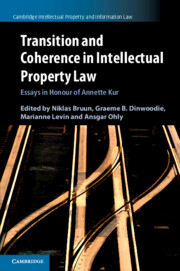Book contents
- Transition and Coherence in Intellectual Property Law
- Cambridge Intellectual Property and Information Law
- Transition and Coherence in Intellectual Property Law
- Copyright page
- Contents
- Preface
- Greetings to Annette Kur from the Second Floor
- Annette Kur: Toward Understanding
- Part I Transition
- Part II Coherence
- A Intellectual “Property” and its Limits
- B IP Overlaps
- C (Un-)fairness
- 34 Geographical Indications as Intellectual Property Rights – Beyond Transition and Coherence
- 35 Presence or Absence of Coherence in Trade Identity Protection in the European Union
- 36 Virtue Ethics and Private Law – A Sketch
- 37 Closing the Gap: How EU Law Constrains National Rules Against Imitation
- 38 European Union Law and Slavish Imitation: An Update in Honour of Annette Kur
- 39 The German Misappropriation Origins of Trademark Antidilution Doctrine: A Translation of the 1924 Odol Opinion of the Elberfeld Landgericht
- 40 The Relationship Between the Unfair Competition Regime and IP Law
- 41 Comparative Advertising: Does Trade Mark Law Over- or Under-Protect the Average Consumer? A Couple of Recent Examples of Asian Jurisdictions Going their Own Way
- Conclusion
- Cambridge Intellectual Property and Information Law
39 - The German Misappropriation Origins of Trademark Antidilution Doctrine: A Translation of the 1924 Odol Opinion of the Elberfeld Landgericht
from C - (Un-)fairness
Published online by Cambridge University Press: 29 December 2020
- Transition and Coherence in Intellectual Property Law
- Cambridge Intellectual Property and Information Law
- Transition and Coherence in Intellectual Property Law
- Copyright page
- Contents
- Preface
- Greetings to Annette Kur from the Second Floor
- Annette Kur: Toward Understanding
- Part I Transition
- Part II Coherence
- A Intellectual “Property” and its Limits
- B IP Overlaps
- C (Un-)fairness
- 34 Geographical Indications as Intellectual Property Rights – Beyond Transition and Coherence
- 35 Presence or Absence of Coherence in Trade Identity Protection in the European Union
- 36 Virtue Ethics and Private Law – A Sketch
- 37 Closing the Gap: How EU Law Constrains National Rules Against Imitation
- 38 European Union Law and Slavish Imitation: An Update in Honour of Annette Kur
- 39 The German Misappropriation Origins of Trademark Antidilution Doctrine: A Translation of the 1924 Odol Opinion of the Elberfeld Landgericht
- 40 The Relationship Between the Unfair Competition Regime and IP Law
- 41 Comparative Advertising: Does Trade Mark Law Over- or Under-Protect the Average Consumer? A Couple of Recent Examples of Asian Jurisdictions Going their Own Way
- Conclusion
- Cambridge Intellectual Property and Information Law
Summary
Frank Schechter introduced the concept of trademark dilution to American readers in his 1927 Harvard Law Review article “The Rational Basis of Trademark Protection.”2 He concluded the article by noting that his formulation of the concept “is fortified by the doctrine that has developed within recent years in German law on this same point.”3 In waiting until the end of his article to refer to the German case law, Schechter effectively implied that dilution was a home-grown American idea – indeed, that it was Schechter’s own, original idea – and that the German courts just happened to have come up with a similar notion. In fact, Schechter appears to have taken the concept of trademark dilution and much of the rhetoric he used in describing it – including “selling power” and the very term “dilution” – from a single German trial court opinion, specifically, the opinion of the Elberfeld Landgericht in the 1924 Odol case.4 The enormous significance of the Odol opinion for American and global trademark law still remains unappreciated. In honor of Annette Kur’s path-breaking and decades-long work in forging mutual understanding between the European and American trademark law systems, presented here is the first full translation into English of the Odol opinion, trademark dilution’s “ur-case.”5
- Type
- Chapter
- Information
- Transition and Coherence in Intellectual Property LawEssays in Honour of Annette Kur, pp. 460 - 466Publisher: Cambridge University PressPrint publication year: 2021



